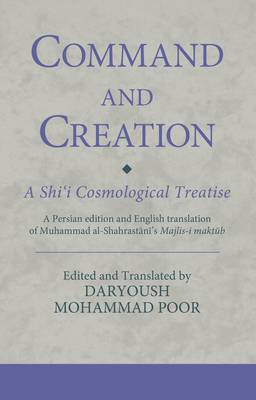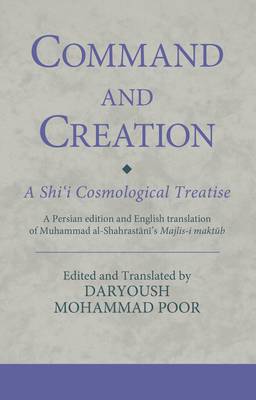
Bedankt voor het vertrouwen het afgelopen jaar! Om jou te bedanken bieden we GRATIS verzending (in België) aan op alles gedurende de hele maand januari.
- Afhalen na 1 uur in een winkel met voorraad
- In januari gratis thuislevering in België
- Ruim aanbod met 7 miljoen producten
Bedankt voor het vertrouwen het afgelopen jaar! Om jou te bedanken bieden we GRATIS verzending (in België) aan op alles gedurende de hele maand januari.
- Afhalen na 1 uur in een winkel met voorraad
- In januari gratis thuislevering in België
- Ruim aanbod met 7 miljoen producten
Zoeken
Command and Creation
A Shi'i Cosmological Treatise: A Persian edition and English translation of Muhammad al-Shahrastani's Majlis-i maktub
Daryoush Mohammad Poor
€ 52,45
+ 104 punten
Uitvoering
Omschrijving
Among the considerable oeuvre of Muhammad al-Shahrastani (1086-1153), the prominent Persian theologian and heresiographer, the Majlis-i maktub ('The Transcribed Sermon') is his only known work in Persian. First delivered as a sermon in Khwarazm in Central Asia, this treatise invokes the theme of creation and command, providing an esoteric cosmological narrative where faith, revelation, prophecy and the spiritual authority of the Household of the Prophet are interwoven. The Majlis-i maktub further discusses themes such as the evolution of religious law (shari'at) and its culmination in the qiyamat(resurrection), the relation between free will and predestination, the interplay between the exoteric and esoteric aspects of faith, and the role and function of the Shi?i Imams in the cosmological narrative.
This treatise is arguably the most dense expression of al-Shahrastani's thought, and it demonstrably indicates the Ismaili inclination of this Muslim scholar who has usually been regarded as a Shafi'i-Ash'ari. Daryoush Mohammad Poor's comparative study of this treatise and the corpus of Nizari Ismaili literature from the Alamut period (1090-1256) reveals the massive impact of al-Shahrastani's thought on every aspect of the doctrines of Nizari Ismailis.
This treatise is arguably the most dense expression of al-Shahrastani's thought, and it demonstrably indicates the Ismaili inclination of this Muslim scholar who has usually been regarded as a Shafi'i-Ash'ari. Daryoush Mohammad Poor's comparative study of this treatise and the corpus of Nizari Ismaili literature from the Alamut period (1090-1256) reveals the massive impact of al-Shahrastani's thought on every aspect of the doctrines of Nizari Ismailis.
Specificaties
Betrokkenen
- Auteur(s):
- Uitgeverij:
Inhoud
- Aantal bladzijden:
- 240
- Taal:
- Engels
- Reeks:
Eigenschappen
- Productcode (EAN):
- 9780755602971
- Verschijningsdatum:
- 8/04/2021
- Uitvoering:
- Paperback
- Formaat:
- Trade paperback (VS)
- Afmetingen:
- 140 mm x 216 mm
- Gewicht:
- 285 g

Alleen bij Standaard Boekhandel
+ 104 punten op je klantenkaart van Standaard Boekhandel
Beoordelingen
We publiceren alleen reviews die voldoen aan de voorwaarden voor reviews. Bekijk onze voorwaarden voor reviews.









